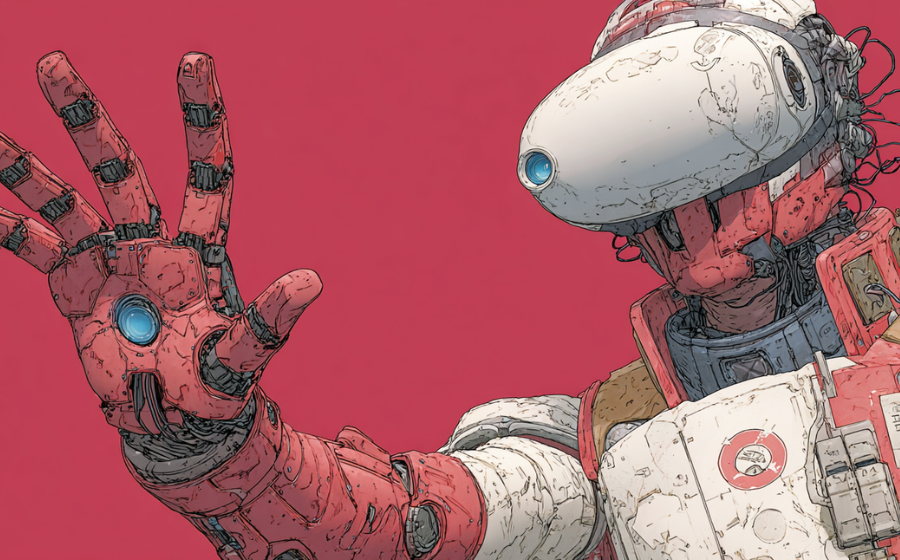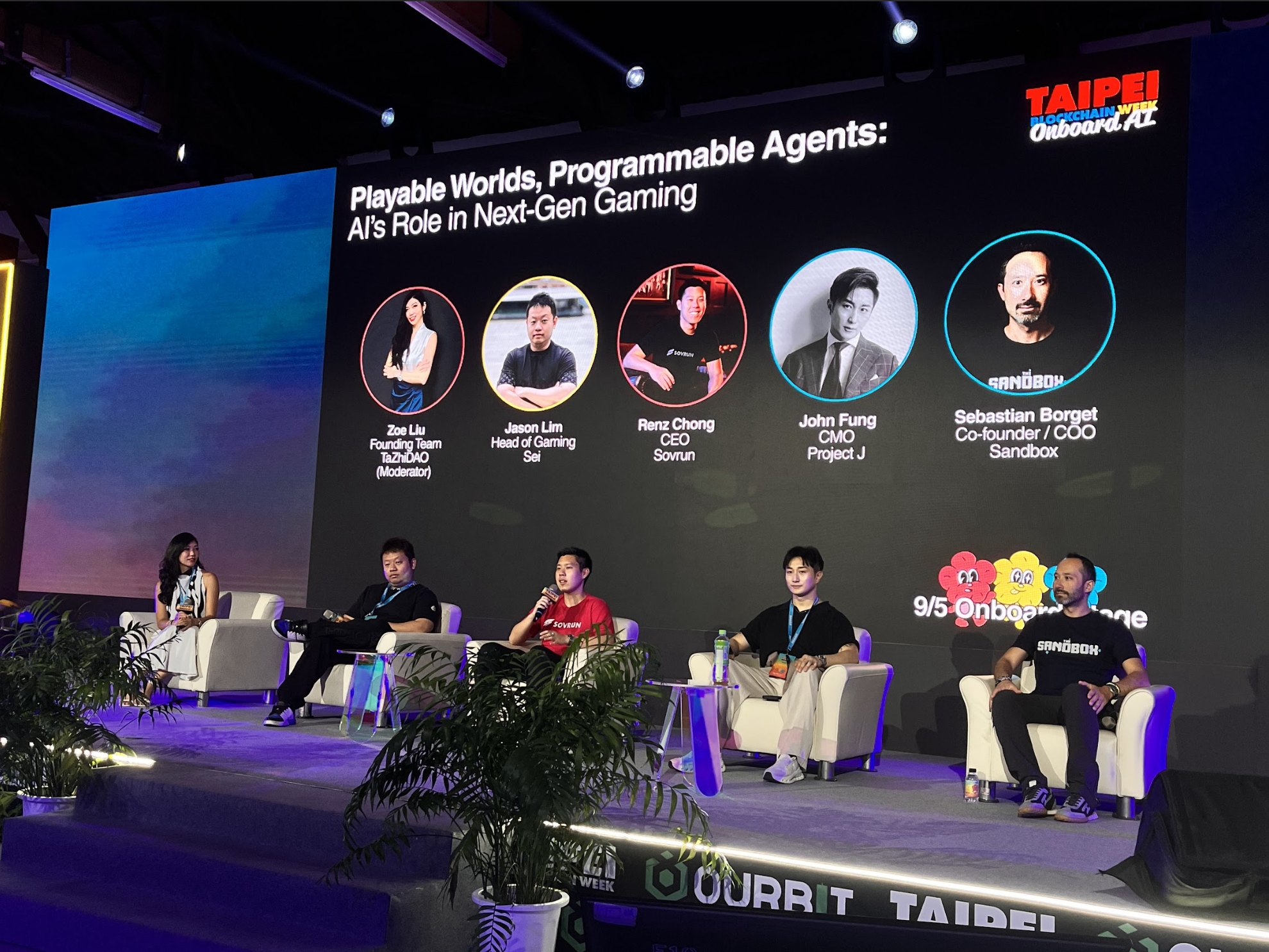
KEYTAKEAWAYS
- Programmable AI agents redefine gameplay by reacting dynamically to players, creating immersive worlds where interactions feel authentic, unpredictable, and engaging across evolving contexts.
- Training challenges highlight the balance between adaptability and consistency, as agents must remain believable and coherent without drifting into erratic behavior that undermines immersion.
- Sustainable business models, from subscriptions to platform-level support, are essential to ensure AI’s viability, delivering real value to players while covering significant computational costs.

- KEY TAKEAWAYS
- COINRANK AT TAIPEI BLOCKCHAIN WEEK
- AI AGENTS AND DYNAMIC INTERACTION
- TRAINING CHALLENGES IN PLAYABLE WORLDS
- BUSINESS MODELS FOR AI-POWERED GAMING
- AI IN THE GAME DEVELOPMENT WORKFLOW
- MASS ADOPTION AND THE FUTURE OF ENTERTAINMENT
- THE HUMAN ELEMENT: IMMERSION AND TRUST
- CONCLUSION: NEXT-GEN GAMING TAKES SHAPE
- DISCLAIMER
- WRITER’S INTRO
CONTENT
CoinRank reports from Taipei Blockchain Week 2025 on how AI-powered agents, playable worlds, and sustainable business models are reshaping the future of interactive gaming and entertainment.

COINRANK AT TAIPEI BLOCKCHAIN WEEK
CoinRank participated in Taipei Blockchain Week 2025 as both an observer and content partner, continuing its mission to document how blockchain, AI, and gaming intersect to shape the future of digital economies.
With this year’s central theme “Onboard AI,” the event became a global stage for discussions on artificial intelligence in entertainment. One of the most forward-looking sessions was the panel “Playable Worlds, Programmable Agents: AI’s Role in Next-Gen Gaming,” which explored how dynamic AI agents and programmable virtual environments will reshape the gaming industry.
This discussion highlighted not only the promise of immersive, AI-driven experiences but also the sustainability and business challenges that developers, platforms, and players must address as gaming enters a new era.
AI AGENTS AND DYNAMIC INTERACTION
Programmable AI agents represent a turning point in interactive design. Unlike static non-playable characters, these agents adapt in real time to player input, offering responses that feel natural and unpredictable. Panelists introduced the concept of a “dynamic area,” in which agents continuously react to user behavior, creating an experience that evolves organically rather than following a rigid script.
This level of interaction is designed to simulate the unpredictability of real-world encounters. Instead of memorizing patterns, players engage with characters that respond intelligently to decisions, questions, or even subtle actions, bringing a sense of life to the game world.

TRAINING CHALLENGES IN PLAYABLE WORLDS
Building believable AI companions requires more than technical prowess; it requires consistency. If an agent reacts unpredictably or breaks established character traits, immersion quickly dissolves. Training models to remain consistent while also adapting to context is one of the most complex challenges in gaming today.
Traditional scripting struggles to keep pace with evolving mechanics or player creativity. Machine learning approaches provide a pathway forward by allowing agents to learn from interaction history. Yet, the danger is behavioral drift—when adaptability undermines continuity. Success depends on striking the delicate balance between flexibility and stability, ensuring that agents remain both engaging and trustworthy.
BUSINESS MODELS FOR AI-POWERED GAMING
Technological breakthroughs mean little without viable economics. Running AI-driven characters requires significant computational resources, raising questions about who should bear the cost. Developers, platform providers, and players each play a role, but no single model has emerged as dominant.
The panel examined several approaches. Subscription frameworks, similar to popular dating simulators, present one potential path, as players may be willing to pay for ongoing engagement with intelligent, entertaining companions. Another option involves infrastructure providers covering costs in exchange for long-term growth, particularly where AI becomes a platform-level feature.
Ultimately, the market will reward solutions that deliver clear, lasting value. Without sustainable revenue streams, developers may hesitate to fully integrate AI despite its creative potential.
AI IN THE GAME DEVELOPMENT WORKFLOW
AI is also reshaping how games are built. Beyond gameplay, developers are leveraging AI to reduce costs in asset production, live operations, and even user acquisition. Instead of building environments from scratch, teams can reuse existing content libraries while using AI to generate variations, saving both time and resources.
This shift not only benefits established studios but also empowers independent developers. Smaller teams now have access to tools that allow them to build rich, expansive worlds once limited to major publishers. The democratization of game development could redefine how content is produced and who gets to create it.
MASS ADOPTION AND THE FUTURE OF ENTERTAINMENT
The panelists agreed that mass adoption of AI in entertainment is inevitable. As costs decrease and tools become easier to use, the boundary between creators and consumers will blur. Players will increasingly become co-creators, shaping experiences through user-generated content.
Future ecosystems may see players designing their own dynamic skins, in-game assets, or even custom agents. This trend will push gaming toward more fluid, player-driven worlds, where content evolves continuously and unpredictably. In such an environment, distinguishing between human-controlled and AI-controlled characters may become nearly impossible.
THE HUMAN ELEMENT: IMMERSION AND TRUST
While AI can bring worlds to life, the human element remains crucial. Emotional resonance—whether humor, empathy, or strategic cooperation—ensures that player connections to characters feel authentic. The most advanced technology will fail if it does not create trust and emotional engagement.
Developers must also manage the risks of over-monetization and poor balance. If AI tools are designed to maximize profits at the expense of enjoyment, players will quickly disengage. Success in the AI gaming era will require aligning commercial interests with genuine player value.
CONCLUSION: NEXT-GEN GAMING TAKES SHAPE
The Taipei Blockchain Week panel underscored that AI is not simply a technical upgrade—it is redefining the very foundations of gaming. From dynamic agents and evolving simulations to new subscription models and development efficiencies, the industry is preparing for its next leap forward.
Playable worlds and programmable agents are no longer distant concepts; they are the blueprint of tomorrow’s gaming ecosystems. Challenges in training, sustainability, and trust remain, but the trajectory is clear: AI will be central to the next generation of entertainment.
CoinRank’s coverage of Taipei Blockchain Week confirms that those who treat AI as more than just a tool—those who use it to deepen storytelling, expand immersion, and build sustainable ecosystems—will lead the future of gaming.
>>> More to read:
【Taipei Blockchain Week 2025】BTC-Fi: Bringing Intelligence to Bitcoin
【Taipei Blockchain Week 】Stories from the Ethereum Foundation












